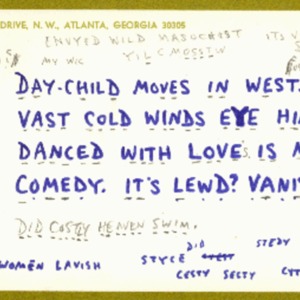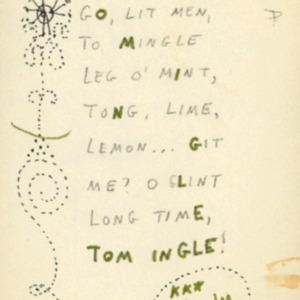"best not shown too widely": James Merrill's Combinatorial Texts
Dublin Core
Title
Description
Among the James Merrill papers are numerous pages recording Merrill's attempts to fashion poetic lines from prescribed sets of letters. These combinatorial texts include several anagrams and variations on the names of celebrities, friends, and even of Merrill himself. There are anagrams using letters from phrases, such as the various permutations of the letters in the phrase "Polish Subtitles," as well as pages jammed with his attempts to write a line using every letter of the alphabet at least once. Such texts — composed over a period of decades, scribbled, abandoned, or sometimes sent to friends – were clearly intended as amusement for both their author and their audience, and little more. They make no claims to have any relationship to his published writing. They are inside jokes to be shared among friends, as evidenced by an explanatory note to David Jackson warning that “my new verse form. . . . [is] best not shown too widely."
These exercises — many of which appear on scraps of paper, ATM receipts, and in the margins of drafts of other work — seem more congruent with the practices of the mid-twentieth century modernism of John Cage or the Oulipo movement, than with those of Merrill, the inveterate formalist. Indeed, whether we choose to view them as idle diversions or as a sort of linguistic warm-up, Merrill's combinatorial texts are most notable in how little they seem to have in common with his published work. In these exercises, Merrill severely limits his choices to create amusement, and, in some cases, sense. In many ways this is not dissimilar to his inclination toward formalism. In both practices the poet is working within a limited construct and struggling to reach its limits. Both constrain the poet's choices, presumably to help give rise to meaning. Finally, both are born of the idea that language is not merely a medium for communicating ideas, but that through the manipulation of language we are able to arrive at meaning.
For all his flirtation with combinatorial practice, it only appears explicitly in a few places in Merrill's body of work. One of only a very few such instances occurs in "ANAGRAM/ANAGRAMME," the fourth section of the poem "EIGHT BITS." Merrill incorporates words using letters from the name of Italian film director Pier Paolo Pasolini, and does so impressively, in rhyming couplets in both English and French.
Here Pasolini lies, decorum's foil,
Writhing in PAIN and crumbling into SOIL.
Ci-gît Pasolini , après de longs effrois,
Son corps devenant PAIN, ses cris devenus LOIS.
Unlike his unpublished work in a similar vein, Merrill is clearly in control here. Typically, he has chosen a difficult construct, and executed it brilliantly, seemingly without effort. Perhaps this is possible in this instance because Merrill is not using the anagram strictly, as in his unpublished writings. He does not relinquish control of the lines, but couches combinatorial writing within lines that remain, stylistically, his own. Thus, the emphasis of the section, and of the poem as a whole, lies in the found quality that informs its creation, not so much in the poet's struggle against the text. Here we see the divide between Merrill's combinatorial texts and his serious work. In his combinatorial texts Merrill often tightly proscribes his composition within a narrow set of rules and then allows those rules to govern his writing, something he was unwilling to do in a published work. Even in his poems which use material from Ouija sessions, supposedly found texts, Merrill remains in control stylistically.
The overwhelming bulk of Merrill's combinatorial texts is never taken up to be worked into finished poems, but remains a raw exploration of language. Indeed, common to all combinatorial texts is an unfinished quality. Their challenge is infectious, as one wonders what other permutations are possible, or what ideas the text will yield. If nothing else, these texts show another side of a poet devoted to the mystical and formal aspects of poetry as he takes guiding conceits to extremes. They provide examples of the connection between many aspects of Merrill's writing life: his letters, formalism, interaction with culture, and a belief fundamental to poetry, that the manipulation of language gives rise to meaning.
Creator
Identifier
card1972.gif


